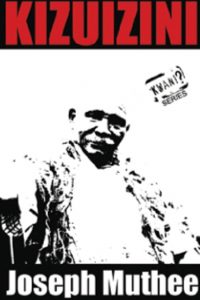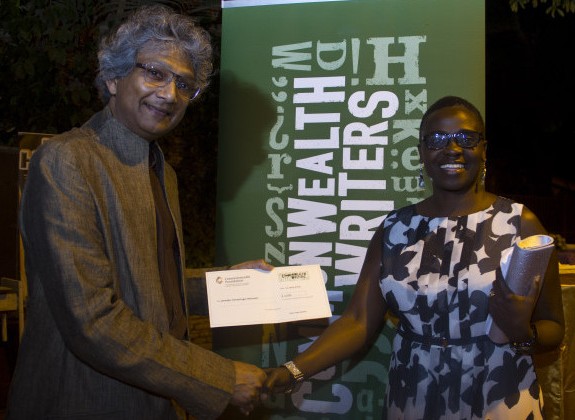By Phylis Luganda
Published December 5, 2007
 Kizuizini, the account of author Joseph Muthee Murage during five years imprisonment for being associated with an outlawed movement, Mau Mau, during the struggle for independence in Kenya in the 1950s, was in September 2007 awarded the second prize in the fiction section of the Kiswahili category of the Jomo Kenyatta Prize for Literature during the 10th Nairobi International Book Fair. PHYLIS LUGANDA reviews the book.
Kizuizini, the account of author Joseph Muthee Murage during five years imprisonment for being associated with an outlawed movement, Mau Mau, during the struggle for independence in Kenya in the 1950s, was in September 2007 awarded the second prize in the fiction section of the Kiswahili category of the Jomo Kenyatta Prize for Literature during the 10th Nairobi International Book Fair. PHYLIS LUGANDA reviews the book.
RELATED: From Terror to Hope Inspires, Tells You that Everything is Possible in Life
Literary critics and journalists could hardly believe that a non-fictional account could be considered for and end up winning a fiction award like the 264-page Kiswahili book written by 79-year-old Murage did when it was recognised by Kenya’s foremost literary prize. Till now the organisers, the Kenya Publishers Association who also run the Nairobi International Book Fair, are yet to explain this development.
This book also raises the issue of whether the Mau Mau fought for Kenya’s independence or Kikuyu interests. Unlike any other community in Kenya, the kikuyu, due to their proximity to the capital, Nairobi, and the former white highlands, were affected more by the alienation of their land and labour and therefore rose up to defend their interests. Whether this was in the context of seeking independence for Kenya as we know it today remains debatable.
It sounds so comical when Murage keeps on repeatedly writing that the Mau Mau fought for Kenya’s independence and referring to Mau Mau as ‘our honourable freedom fighters’. But then he hits home when he says that Kikuyu youth were taught how to defend and fight for the resources of the Kikuyu community (page 155) and fight for their land (page 112).
However this is not to say that Murage does not present an intriguing tale that makes it difficult to put down his book once one has started reading it. In fact, it reads more like something based on fictional rather than factual accounts.
The book is supposed to be an account of what happened during the period when the British colonial authorities led by Governor Evelyn Baring declared the state of emergency in Kenya in 1952 following rising levels of insecurity in Nairobi and the white highlands due to Mau Mau insurgency.
Murage says he was a trusted and much loved farm employee of Captain C O’Hagan who referred to him as ‘son.’ Despite this, he says Captain O’Hagan still handed him to colonial authorities for detention for his suspected Mau Mau links.
Kizuizini (detention) is the narration of Murage’s experience in five detention and jail camps across Kenya. The author writes that he was finally released in 1959 but then went to work for another settler in order to meet his basic needs and pay taxes to the colonial authorities. He later became a Kenya African Union leader in his village in the run up to independence in 1963.
However, he writes that he still yearns for the real freedom that the Mau Mau fought for as there is very little of it in independent Kenya. Here, he writes, Kenyans do not care about one another, only caring to satiate their own desires.
Though he says he attended the political independence ceremony in Nairobi in 1963, that is where his account and life ends. The book may have been published in 2006, but it is as if Murage no longer exists.
Part of the Kwani? book series, Kizuizini is written in relatively good standard Kiswahili and is suitable for all people who can speak, write and read Kiswahili. Though the author has included some pictures of detainees during the period under consideration, they are too small to be of much use as illustrations.
Another uniqueness of Kizuizini is that unlike other historical books that tend to be boring as they present accounts drably and boringly, this one is likely to arrest and keep the reader’s attention from the first sentence to the last, 264 pages away. The narration is not just uplifting but also detailed, even presenting issues before the birth of the writer. For instance, he quotes, verbatim, the conversation between his grand father and a settler who offered him a job on his farm long before Murage was born.
And that is not all: He reproduces long speeches made by jailers, confidential reports, and even the thoughts that cruised in the minds of some of the characters in the book. Does it then surprise any one that the judging panel of the Jomo Kenyatta Prize for Literature placed it in the fiction category in September 2007?
A keen reader has the feeling that the book is spiced up with some make-believe accounts to attract interest. The events appear to be embellished as one cannot be expected to recall all details of events that happened many years back without the benefit of record-keeping using writing, audio or visual recording. It is almost incredible to hear that badly beaten and injured employees were forced to work on Captain C. O’Hagan’s farm and that Murage organised feasts for the Mau on the farm without being noticed yet there were patrols on the farm.
The writer however contradicts himself when he says on page 66 that he usually roasted half of the calf he slaughtered for the Mau Mau and forgets these only two pages away to say that he could not have roasted the meat as the smoke could have given him away.
He again appears to contradict himself when he says the government paid for the cost of the police guarding Capt O’Hagan’s farm (page 74) and also that Capt O’Hagan paid for the police (page 77).
Murage, though with a knack for details, fails to tell the reader where his family was during his incarceration. Had they not been removed from the farm and brought to the chief”s camp the day he was arrested? One only reads that he reunites with them at Gikumbo on his release. There is no mention of his wife, mother or father. In fact, one does not read anything about the contribution of women to the Mau Mau struggle.
The author also fails to give two names of most people he mentions in his account, giving the impression that they may have been invented. But it is good to see him mention familiar names like Isaya Mathenge and JM Kariuki. For the first time one hears that Jomo Kenyatta had a son called Muigai Kenyatta who, after some years in detention, joined the colonial forces and was promoted to the rank of Special Branch 2nd Officer. Among other duties, the younger Kenyatta interrogated Mau Mau suspects in detention.
Another shortcoming of Kizuizini lies in its editing lapses. It looks like this was not done by a person well grounded in the standard Kiswahili or in the good command of punctuation. Is it likely that it was not proof-read at all prior to its being printed? Many of the mistakes could have been sorted out at the proof-reading stage.
RELATED: The Best Destinations for Crime Fiction Lovers
Things like achacheni (instead of achaneni), tutaonodoka (for tutaondoka), nilimjibi (for nilimjibu), hiii (for hii) not only lower the stature of the book but also question what else in the book is not factual if simple things like editing cannot be easily fixed. What editor or proofreader would render a sentence as: “La pili, lilikuwa lile letu tuliloishi la Lusoi, lililoenea hadi Mto wa Honi, kukaribia milima ya Kamatongu mkabala wa Muiga kuteremka na mto hadi Kiganjo na kwendelea hadi kando ya Msitu wa Mlima Kenya, katika Mto wa Thigu eneo la Ndathi ambamo sasa mnapatikana kiwanda cha maziwa cha Brookside, kupakana na eneo la Ngai Ndeithya yaani, Mungu nisaidie kwani eneo lile lilikuwa na mapango ya Nyange ambapo wachezaji haramu wa karata walikuwa wengi” or words like “mwajidanganyawakatimnapingamatakwayawananchi” or “mwibaraalikuwanikijanamwenyeumrimdogotuliyembandika“?
One may also take issue with the style of writing dates and time: Why not just write 10-04-1954 or 10/04/1954 instead of rendering it as “Tarehe kumi Aprili, mwaka elfu moja, mia tisa hamsini na nne“? And all dates appear this way leaving one wondering if the writer was not doing this to lengthen his book. And this kind of date writing lands the writer in a ditch when he writes that Harry Thuku stood in for the Kenya African Union leader, Jomo Kenyatta, in 1987 (mwaka wa elfu moja, mia tisa, themanini na saba) was in Britain. Kenya’s founding president, Kenyatta, had, in fact, been dead for 10 years in 1987!
Unlike newspapers or a review like this one that may be written, edited and published by an individual, a book, by the virtue of its long shelf span, is expected to pass through many experts to ensure it is, well, almost, perfect.
It would have been better to have a glossary instead of explaining the meaning of some words in other languages in the story because this tends to distract the reader and interfere with the flow of the story.
As already noted, Kizuizini ends rather hurriedly and melodramatically, not at all in the style of the earlier part of the book that tends to be detailed. The reader may ask what the hurry was for for winding up the book in such a manner.
Many local writers tend to ignore historical literature and therefore it is heart-warming for people like Murage to be dabbling in such an area and producing relatively well written books in the national language- Kiswahili. However Kizuizini appears to be more of fiction than non-fiction and the Jomo Kenyatta Prize for Literature judging be faulted for their decision to include it in the former and not latter category.
Additional information by Ogova Ondego




